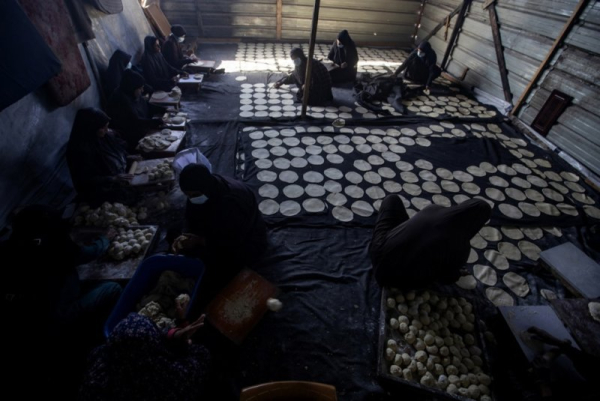
Palestinian women make bread at the Al-Mawasi humanitarian area west of Khan Younis. Dozens of people were killed in Israeli airstrikes on Khan Younis, Beit Lahia and Gaza City. Photo by Haitham Imad/EPA-EFE
Scores of people were killed overnight in Israeli airstrikes on houses in two locations in northern Gaza where displaced people were sheltering, according to media reports and agencies run by Gaza’s Hamas-led administration.
The strikes near the Kamal Adwan hospital in Beit Lahia killed 66, including women and children. At least 22 others were killed when a house in the Sheikh Radwan district of Gaza City was struck, said the Civil Defense agency. Advertisement
To the south in Khan Younis, two dozen people were killed in Israeli military action in the area and in nearby Rafah, according to a hospital where the bodies were taken.
Kamal Adwan hospital director Hussam Abu Safia told Al Jazeera most of the victims of the attack in Beit Lahia were killed as they slept.
“A very large number of casualties has arrived, and there are still many bodies hanging on the walls, ceilings. It’s mostly children and women,” said Abu Safia who added that staff had rushed to the scene, retrieving bodies, gathering up remains and rescuing people trapped beneath the rubble. Advertisement
“We are already operating with the bare minimum resources, that is why most of our staff are now busy rescuing the injured due to the lack of ambulances and resources,” added Abu Safia, whose specialty is in pediactrics.
“The situation is honestly very dire. We cannot cope with this massive number of injured and casualties that have arrived at Kamal Adwan hospital.”
Figures published online Thursday by the enclave’s Hamas-run health ministry put the number of people killed in Gaza since the start of the war at 44,056 and 104,268 injured.
The Israeli action came hours after the United States vetoed a United Nations Security Council draft resolution on Wednesday calling for an immediate, unconditional and permanent cease-fire in Gaza and the release of all hostages.
Speaking ahead of the vote in New York in which the other 14 members voted in favor of the resolution, U.S. Ambassador to the U.N. Robert Wood said Washington had worked tirelessly to avoid the impasse but ultimately “could not support” the resolution because the ceasefire it offered did not hinge on the release of the hostages who have been held in Gaza for more than 400 days. Advertisement
“We made clear throughout negotiations we could not support an unconditional cease-fire that failed to release the hostages. This resolution abandoned that necessity,” said Wood.
The drew angry response from the Chinese, Russian and Algerian delegations which accused the United States of repeatedly upending cease-fire efforts while standing by as Israel committed egregious breaches of humanitarian law.
Wood fended off the criticism saying it was Hamas that was standing in the way of a cease-fire and the resolution would have signalled to Hamas that it no longer needs to negotiate.